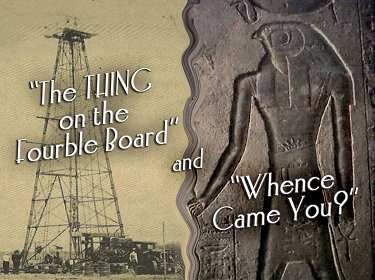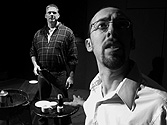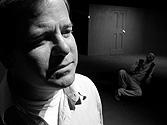|
"Moody...
captivating... eerie!" -BackStage West
|
|
"Succeeds in transporting us back to
the
time before entertainment got so diluted and
dumbed down." -L.A. Weekly (Recommended)
|
|
"A
very enjoyable evening of theater!"
-KPFK 90.7 FM ("Don't Touch That Dial")
|

Two Tales of
Hushed Horror
from the Golden Age of Radio:

by Wyllis
Cooper
directed by Corey Klemow
starring Tom Kiesche,
Michael Lanahan & Bart Shattuck
with Josh Petroski and the voices of
David Lawrence and Julie Lockhart
Nov. 19 - Dec. 17, 2004
Fridays @ 10pm
Admission: $10
Reservations: (310) 281-8337
or Purchase Tickets Online!

|
LISTEN
TO A PREVIEW! |
 MS
Media MS
Media
Version |
 Real
Player Real
Player
Version |
 MP3 MP3
Version |
|
Featuring
(in order of appearance)
David Lawrence, Brenda Varda & Tom Kiesche |
|
Tom's
performance is excerpted
from a live appearance on
"The David Lawrence Show"! |
An oil rig
digs up... something... best left where it was.
An archaeologist is lured by a mysterious siren.
|
 "Quiet,
Please," an anthology of the strange, the suspenseful and the
supernatural, was a precursor to "The Twilight Zone." "Quiet,
Please," an anthology of the strange, the suspenseful and the
supernatural, was a precursor to "The Twilight Zone."
Created and solely written by Wyllis Cooper (who also created
"Lights Out," and who Rod Serling once cited as an influence
on his own work), "Quiet, Please" is a landmark in horror
writing, relying on richly drawn and deeply human characters to chill
its audience.
 Not
merely a radio re-creation, this production fully stages two of the best
episodes of this classic series... while still letting your imagination
do most of the work needed to scare you stiff. Not
merely a radio re-creation, this production fully stages two of the best
episodes of this classic series... while still letting your imagination
do most of the work needed to scare you stiff.
For more information on "Quiet, Please," visit www.QuietPlease.org
|
CLICK ON THE
PHOTOS TO SEE LARGER VERSIONS
Producers - Aaron
Francis & Corey Klemow
Lighting Designer - Douglas Gabrielle
Sound Designer - Cricket S. Myers
Prop Designer - C.M. Gonzalez
Costume Coordinator - Lou Burnstein
Publicity Photos - Sean Kinney
Theme Music performed by Brenda Varda
|
FEATURE
ARTICLE |
|
BackStage
West
Radio
Days
Not just a theatrical imperative that usually follows the sound of
searching through large rustling bags or patrons explaining punch lines
at length to their companions, Quiet, Please is the first
"real project" that Sacred Fools actor Corey Klemow will be
directing at the company's theatre. It's also the name of a radio
show that ran from 1947 through 1949, and the production will consist of
two scripts from the series - Whence Came You? and The Thing
on the Fourble Board - the sort of cerebral suspense stories that
existed back before it was considered fair game to elicit audience
response with gallons of vividly hued blood.
It's not going to simply be actors taking their turn at the mic
performing a radio drama, nor will it be a full realization of what has
formerly only existed between the ears of the audience. Klemow
promises a minimalist production mounted on a stage recently painted
entirely black: "Mostly it'll be props, costumes, lighting,
sound, and of course the performances and the script, that will build
this world. I'm going to trust that the words are absorbing
enough. It really is a storytelling series to a great extent, sort
of a combination storytelling series and memory play." Klemow
will be retaining the music that originally led into the show, Cesar
Franck's emotive Symphony in D Minor, but swears he'll drop that
traditional underscoring of radio audience apprehension: the plangent,
melodramatic organ. "I'm keeping waaaaay far away from
that," he promises.
It's not that Klemow is particularly enamored of the radio genre - some
he likes, some he just finds hokey - but a couple of years ago a friend
sent him the link to the script for The Thing on the Fourble Board
(www.geocities.com/emruf6/59.html, but if you crave surprise hold off on
checking it out), and it made a considerable impression. "I
read it and enjoyed it. It occurred to me even as I was reading it
that this would look kind of neat onstage, that I could do it without
changing too much, and that it would be interesting and
compelling. It kind of just stuck in my head for a while, and I
mulled it over."
Not long thereafter Sacred Fools had an informal artistic roundtable to
discuss the kind of shows the company should do, and why. The
suggestion was made that perhaps there might be a bit more focus on the
"black box" kind of show, the sort of thing that would rely
on, and showcase, the sort of quality actors the company has in
abundance. Klemow realized that his idea, as yet incomplete, of
staging Quiet, Please would fit right in. "And I
wondered if maybe I could get somebody else to do it. Then I
realized if I wanted to see it happen that I would have to be the person
who actually proposed it. And so I did."
The original series was created, written and directed by one man, Wyllis
Cooper, and always featured the same actor, Ernest Chappell, in the
central role. Cooper wrote to Chappell's strengths and never
allowed the actor's persona to overshadow the piece, frequently
crediting him merely as "the man who spoke to you." The
consistency of quality was such that the show was cited by Rod Serling
as having been an influence in the creation of his seminal television
series The Twilight Zone, a show that appreciated gripping drama
but tended to add the additional layer of a social message. "Wyllis
Cooper's strength as a writer is in characterization and in really
drawing you in," Klemow discovered. "What's unique about
Quiet, Please is that it was centered on one character who does a
lot of talking directly to the audience, which was a very good use of
radio. You felt like you were the one person he was talking
to." Klemow acknowledges that even a craftsman at the level
of Cooper's can have his bad days, too. "Wyllis Cooper
occasionally tried to be relevant, but he wasn't very good at it.
His one main issue, this being 1947-49, was nuclear war, and pretty much
all he had to say about it was that it would be bad."
Consideration was given to the tenor of the piece, as well as its 10
p.m. late-night slot, and it was originally scheduled to run during the
cycle that would have had it up for Halloween. Unfortunately,
Halloween coincided with a heated political season, and when the company
got the opportunity to be part of the Laura's Bush phenomenon and
stage the political sex farce concurrently with theatres across the
nation, Quiet, Please was moved.
Klemow is hoping the show will appeal to fans of old-time radio drama,
as well as to those who have never heard one before. He has chosen
two scripts that he fells "really lend themselves to being put
onstage." Klemow is primarily relying on the radio
convention, used to great advantage in this particular series, of making
the audience feel as if it's a part of the action, something he believes
will translate well to a theatrical setting. "These [stories]
so firmly keep their Things and their horrors kind of offstage that you
don't need to see it. It really will be still in the audience's
mind."
A fourble board, by the way, is the floor of an oil derrick.
Driving you crazy, wasn't it?
--
Wenzel Jones
©2004 BackStage
West |
|
REVIEWS |
|
BackStage
West
Before
Milton Berle and Lucille Ball helped make television the dominant form
of home entertainment, there was the Golden Age of radio. In the 1940s,
the top actors and writers created groundbreaking, edgy dramas, many of
which are still powerful pieces of entertainment. Sacred Fools Theater
Company is paying tribute to classic radio legend Wyllis Cooper with
staged performances of two of his spine-tingling half-hour dramas.
Cooper wrote these tales, reminiscent of Twilight Zone episodes, for the
program Quiet, Please. Director Corey Klemow's moody production is
captivating. The cast of four, in particular leading actors Tom Kiesche
and Bart Shattuck, skillfully balance the intense acting style of
classic radio with a modern sensibility to deliver eerie performances.
In The Thing on the Fourble Board, Kiesche is Porky, a one-time
roughneck on an oil rig. Porky tells the audience about a night 20 years
earlier when he and a surveyor (Michael Lanahan) found a finger in the
mud that was buried thousands of feet and a million years earlier. But
the finger isn't all that seems to have been unearthed. Shattuck takes
the role of an archaeologist named Austin in Whence You Came. Austin and
journalist pal Abe (Lanahan) spy a mysterious woman in Cairo the night
before they open an ancient Egyptian tomb. The tomb is full of
mystery-and danger.
Kiesche is an ideal roughneck. He exudes strength, which evaporates as
his fear grows. Shattuck is believable as the haggard archaeologist, who
seems unable to escape impending doom. Klemow's dark tone is assisted by
the subtle lighting design of Douglas Gabrielle and the authentic
effects created by Cricket S. Myers. These are two simple stories, told
in an understated manner, with pleasing results.
--
Jeff Favre
©2004 BackStage
West |
|
L.A.
Weekly (Recommended)
Corey Klemow’s decision to stage Wyllis Cooper’s ghost stories in the dead-serious storytelling style of old radio theater results in a somewhat stilted but endearing evening of two one-acts. “The Thing on the Fourble Board” and “Whence Came You?,” originally produced as radio dramas for the 1948 season of the horror series Quiet, Please, are the kind of supernatural tales folks used to repeat around a campfire or at a slumber party to get everyone spooked. Klemow attempts to create the casual feel of a dark living room where the family gathered to listen to the radio. “Quiet, please,” a booming male voice commands before the start of each one-act. In both scenarios, a couple of characters must die at the clammy hand of a strange apparition before the mystery is revealed to the bewildered protagonist. Awkward, albeit educational, technical descriptions of an Oxnard oil rig’s operations clutters “The Thing on the Fourble Board,” narrated by a former roughneck (Tom Kiesche), who found something startling down a drill hole. “Whence Came You?” involves more interesting details of a Cairo excavation site (who doesn’t want to hear about tombs and mummies?), where a couple of archaeologists (Bart Shattuck and Kiesche) and a booze-hound journalist (the funny Michael Lanahan) encounter the curse of a beautiful Egyptian princess. Despite or maybe because of the limitations Klemow has set on his actors, who mostly come off as very uptight, his obvious
re-enactment succeeds in transporting us back to the time before entertainment got so diluted and dumbed down.
-- Miriam Jacobson
©2004 L.A. Weekly |
|
Accessibly
Live Off-Line
The Sacred Fools Theatre in Hollywood presents QUIET PLEASE, two stage adaptations of Wyllis Cooper's radio series that ran from 1947 through '49. Unlike Cooper's first radio series Lights Out that catered to the
supernatural, (and launched the career of a struggling playwright named Arch
Obler), Quiet Please told tales that carried uncanny twists that teetered to surreal psychological mystery. Here, the 'Fools' create on the stage a pair of stories from this short running and alas, forgotten radio series.
The two tales told are Whence Came You?, where a archaeologist working in present day (1940's) Cario finds a local woman who is beautiful and somewhat mysterious and the disappearance of a journalist friend who tried to enter a recently discovered tomb. The other tale, and the best written episode from the Quiet Please series, The Thing On The Fourble Board, is about a discovery of a being of some kind seen around an oil rig and the 'roughneck' (oil well worker) who encounters such!
These two very short one acts are quite amusing and repeating, way too short! Then again, these two stories were written for a 25 minute radio show. These performances are not presented as radio shows per se, but staged dramas with moving actors and very limited sets. (Full fledged sets are seen within the minds of the audience!) Corey Klemow directs the cast that includes (in order of appearance), Tom Kiesche, Michael Lanahan, Bart Shattuck, Josh Petroski, and the voices of David Lawrence and Julie Lockhart.
Perhaps there will be more staged productions of QUIET PLEASE produced by the Sacred Fools. These tales are too good to be left for forgotten! Seeing these stories on stage gives the audience a sample of what would later be seen on television a decade's time ahead. A series created by playwright Rob Serling called The Twilight Zone!
--
Rich Borowy
©2004 Accessibly Live Off-Line |

|


![]()



